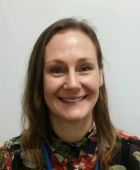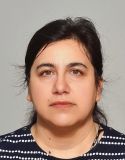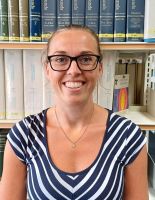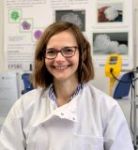Committee Members
Colloids Committee Chair RSC
Dr Sarah Rogers (ISIS-RAL)
- Self-assembly (surfactants, polymers, ionic liquids)
- Nanoparticle synthesis
- Green solvents

UK Colloids Committee Vice-Chair SCI and ECIS 2025
Co-Chair
Dr Richard Greenwood FRSC C.Chem
Richard is currently the Deputy Director of Engineering Doctorate in Formulation Engineering at the School of Chemical Engineering at the University of Birmingham. As of 1 st July 2015 he will be seconded to the Centre for Process Innovation to help establish the National Formulation Centre. He graduated from Bristol University in 1991 with a BSc in Chemistry and obtained a PhD from Chemical Engineering Department at Imperial College in 1995. He has previously chaired the IChemE Particle Technology Special Interest Group and sat on the RSC Formulation Science and Technology Subject Group, where he organised numerous national and international conferences.

Colloids Committee RSC Secretary
Dr Ignacio Martin-Fabiani
- Colloid, interface and soft matter
- Advanced microscopy and scattering techniques
- Material Science in coatings, inks, adhesives, cosmetics and crop protection
Dr Nacho Martin-Fabiani is a UKRI Future Leaders Fellow and Senior Lecturer in Materials Science in the Department of Materials at Loughborough University (UK). He leads a research group working in the fields of colloid, interface, and soft matter science. Current research lines include the development of a new generation of functional coatings – including antibacterial and abrasion resistant surfaces – and experimental and computational methods to aid soft materials formulation. He has received awards and honours for his work, including a Vice-Chancellor’s Research Fellowship at Loughborough University (2016), the Polymer Lecture Exchange Award by the Institute of Physics and the American Physical Society (2019), and a UK Research and Innovation Future Leaders Fellowship (2020). He sits on the Joint Colloids Group committee from the Royal Society of Chemistry and the Society of Chemical Industry and is Associate editor of Frontiers in Soft Matter.

Colloids Committee Vice-Secretary and Acting SCI Treasurer
Dr Peter Shaw
- The formulation, manufacture and use of polyvinyl acetates and polyvinyl alcohols
- The formulation, manufacture and use of synthetic latexes and dispersions
- Film formation of polymer colloids
Dr. Pete Shaw graduated with a BSc Joint honours in Chemistry and Polymer Science & Technology from Loughborough University of Technology, he remained at Loughborough where obtained his PhD in ‘substituted Biphenyl acrylic polymers and Copolymers’. Pete joined The Harlow Chemical Company (Harco) as a Chemist in 1983; working on water-based emulsion polymerisation, and then specialising in both the R&D and industrial-scale manufacture of polyvinyl alcohols, especially in their use as the protective colloid in PVC manufacture worldwide. In 2002 Harco was assimilated into Synthomer Ltd, and Pete was appointed to the position of Technical Manager, Auxiliary Polymers in 2003, Head of Research and Analytical in 2007 and in 2010 he was appointed as the Chief Scientist Synthomer Europe. This role provided research leadership in emerging & innovative technologies, as well as initiating & monitoring Synthomer’s academic programme and coordinating the IP process. Pete retired from Synthomer in 2020, and is keen to maintain his association with Polymers and Polymer Colloids.

Colloids Committee RSC Treasurer
Dr Shirin Alexander
- Polymeric and surfactant micelles
- Green low surface energy materials
- Material chemistry and nanoparticles
- Small angle neutron scattering
- Drug delivery
Shirin Alexander received her PhD in physical chemistry from the University of Bristol, UK in 2012. Her principal research interest is in colloids, surface chemistry, materials, and polymers. Shirin took a postdoctoral research position after her PhD in the Surfactant Research group at the University of Bristol, developing a range of Low Surface Energy Surfactants. Her current research (as a Associate Professor) in Swansea University is mainly focused on material chemistry, where she combines the Low Surface Energy Materials (LSEMs) with metal oxide nanoparticles to obtain novel green (fluorine-free) superhydrophobic surfaces. The applications of LSEMs vary from protective and anti-fouling coatings to environmental, biomedical and industrial applications.

Colloids Committee SCI Treasurer and Social Media Manager
Dr Fiona Hatton
- Polymerisation-induced self-assembly of block copolymers
- Design of functional polymer colloids
- Polymers from renewable resources

Colloids Committee Website Manager
Dr Nicholas J. Darton
- Synthesis and targeting of superparamagnetic nanoparticle linked therapeutics
- Novel microfluidic based chromatography of antibodies
- Biopharmaceutical formulation development
Dr. Darton gained his B.Sc. in Biochemistry at Leeds University in 1998 where he developed a new method for synthesizing amyloid in vitro. He took his Ph.D. in Biochemistry at Cambridge University in 2003 working on improving a phage-display based HIV vaccine by protein engineering. After working in industry for Healthcare Market Research Worldwide and Abcam he began his first postdoctoral research associate position in 2006 building up the Biomagnetics research group in the Department of Chemical Engineering and Biotechnology, University of Cambridge. Following establishment of this group he began a second BBSRC-industry sponsored post doctorate in 2009 developing a novel chromatographic substrate in collaboration with Medimmune, Lonza and Recipharm Cobra. He worked for 7 years as Technical Lead-Formulation at Arecor Ltd., responsible for estabilishing and leading internal and external collaborative biopharmaceutical formulation development programs. Now Dr. Darton is a Principal Scientist in the Early Stage Formulation Sciences team at AstraZeneca.

Colloids Committee Website Deputy Manager and Newsletter
Dr Heather Clarkson
- Polymer and surfactant interactions
- Colloid, drug and active delivery to substrates and interfaces
- Surfactant Science
- Biotechnology in Formulation
Heather graduated with an honours degree in Chemistry with Medicinal Chemistry from the University of Manchester. She obtained her PhD (2004) in Physical Chemistry from the Department of Paper Science at the University of Manchester on the ‘Hydrodynamics of Colloidal Deposition on Biological Subtrates’. She has spent her working career in industry working for multi-nationals such as GSK, Unilever, Croda and Innospec. Her main focus of research has been colloid, drug and active delivery and extraction from substrates and interfaces, particularly through surfactancy and polymer surfactant interaction inter related to formulation scence. Her current role in the chemicals sector working for Innospec is as a Technical Director Surfactant Technologies, developing surfactants and biotechnology for applications in Personal Care, Home Care, Crop Care and Industial applications.

Colloids Committee Awards Coordinator
Dr Craig Fairgrieve
Knowledge Centre for Materials Chemistry
- Sustainable Colloids and Formulations
- Polysacchide surfactant interactions
- Surfactant solution and surface properties
Craig is a Knowledge Transfer Manager at the Knowledge Centre for Materials Chemistry. His role involves building partnerships between industry and academia to enable the application of cutting-edge materials chemistry research. He is responsible for the University of Liverpool and the University of Bolton.
Previously, Craig worked at Unilever from 2011-2022 delivering sustainable, biosourced and biodegradable materials for use in Home Care products. This involved computational predictions of material properties, measurement of solution and interface properties and automated measurement of formulations. This was conducted using facilities in the Materials Innovation Factory at the University of Liverpool and through external collaborations. Prior to joining Unilever, Craig obtained a PhD in Chemistry from the University of Sheffield (2011), MSc in Polymer Science from the University of Sheffield (2006) and a BSc in Chemistry with Industrial Experience from the University of Edinburgh (2005) working at Imerys for 1 year.

SCI Colloid and Surface Chemistry Group
Dr Nick Ainger
Unilever Research & Development
- Surfactant self-assembly
- Polymer and surfactant interactions
- Formulation of colloidal systems
Nick Ainger has worked with personal care products for over 18 years. He completed his PhD in physical organic chemistry at the University of Liverpool (Chemistry, 1999), writing up after taking a position at Unilever R&D at Port Sunlight. He has worked primarily in the area of hair care but has taken an active interest in external collaborations with various institutions whilst applying colloid science expertise to develop new technologies and products.

Dr David G Cameron FRSC CChem CSci
- The formulation of Agricultural Adjuvants
- The formulation of Agricultural Plant Protection Products
- The formulation of Agricultural Plant Nutrients and Biostimulants
David graduated with a degree in Chemistry/Biology and a PhD in Chemistry in collaboration with Nobel Industries Sweden. This was followed by a Post-Doc in Stockholm, and that 1 year extended into a ten year stay in Sweden, the later five years in the surfactant business of Nobel (now Nouryon). David returned to the UK in 1994 and have spent the last 26 years developing the use of surfactants and polymers to improve agricultural applications of plant protection and nutritional products. David is the Chair of the United Kingdom Adjuvant Association and the Metaldehyde Stewardship Group and also the Vice-President of the International Symposium on Adjuvants for Agrochemicals and elected Chairman of the 2021 Conference (ISAA2021.org) to be held in Toulouse 17-21 May, 2021.

ECIS 2025
Co-Chair
Dr Azarmidokht Gholamipour Shirazi
University of Manchester
- Microfuidics
- Soft Materials
- Physical Chemistry of polymers
Azar is a multidisciplinary scientist with academic experience in Chemical Engineering, Chemistry, and Bioscience, which has enabled her to lead interdisciplinary science projects. She completed her undergraduate and Masters qualifications in Chemical Engineering, followed by her Ph.D. in organic and macromolecular chemistry at the University of Lille, France. Since then, Azar has worked as a postdoctoral /research fellow in a wide range of research laboratories in France, Brazil, Norway, China, Czechia, and the UK. She has worked on projects combining microfluidics and flow chemistry, soft materials, and physical chemistry in diverse areas from the reaction kinetics-thermodynamics study and emulsification with applications in organic synthesis and enhanced oil recovery, to the investigation of on-chip cell culture and combinatorial drug screening and isolating cells based on their sizes. She also has experience in graphene synthesis, rheological methods, and 3D printing.

Early Career Colloid Network Representative ECCo
Dr Priyanka Dey
University of Portsmouth
- Colloidal Plasmonic gold nano-assemblies
- Raman spectroscopic cancer diagnosis
Dr Priyanka Dey is currently a Senior Lecturer in Bioanalytical Chemistry at University of Portsmouth, UK. She is also the current chair of the Early Career Colloid (ECCo) group. She attained her Ph.D. in chemistry specialising in colloidal nanotechnology and optical spectroscopy, from Queensland University of Technology, Australia. Since then, her research has been directed toward designing hybrid plasmonic-polymeric nano-assemblies and developing analytical spectroscopic solutions for disease diagnosis. This has included work in enhanced Raman scattering (SERS and SESORS) in Australia and UK, nanoplasmonics and photonics in Germany and optical nanobiosensors for clinical and point-of-care devices in Spain. She has years of experience in the ever-growing domain of novel nanoplasmonics using cutting-edge enhanced optical spectroscopic solutions especially, Raman spectroscopy for clinical diagnostic needs. She loves teaching about materials and analytical chemistry. Priyanka has been actively increasing public awareness about her research in cancer diagnosis via media platforms of BBC TV interviews and multiple radio interviews.

Early Career Colloid Network
Dr David Growney
- Dispersion, emulsion and foam characterisation/understanding
- Neutron, X-ray and light scattering
- Polymer and surfactant characterisation and self-assembly behaviour
- Applications of colloids in lubricants
Dr Growney completed his undergraduate MChem and postgraduate PhD studies at the University of Sheffield, supervised by Prof. Steve Armes. His BP sponsored PhD focussed on the understanding of contaminant soot dispersion in engine lubricant. Upon completion of his PhD in 2015, he took on the role of Chemist at Lubrizol Limited (a speciality chemical company), and has since progressed to the position of Research Chemist in the Strategic Research arm of the company. Dr Growney now leads research focused on future-looking performance additive chemistries. More specifically, the work primarily focuses on the understanding of colloidal dispersions in both aqueous and non-aqueous media, emulsion formation/stability and non-aqueous fluid aeration.

Dr Emma Shore
Innospec
- Surface Science and Surface Properties
- Surfactant Synthesis
Emma obtained her MChem degree in Medicinal Chemistry with Pharmacology from the University of Liverpool in 2012 and remained there for her PhD with Professor Paul O’Neill. Her thesis entitled ‘Selective inhibitors of Cyclophilin D to treat Pancreatitis’ involved the synthesis and characterisation of small molecules as well as biophysical techniques such as isothermal titration calorimetry and surface plasmon resonance.
Emma undertook a short Postdoctoral research position at the University of Liverpool before moving to industry into the role of Research Chemist at Innospec. She has since progressed to the position of Platform Leader – Surface Science where her research focus is on the fundamental understanding of surfactants in both aqueous and non-aqueous media on a range of surfaces from Personal Care to Fuel Technology applications.

RSC Colloid & Interface Science Group
Dr Guido Bolognesi
- Microfluidic synthesis and manipulation of nano-/micro-particles
- Experimental microfluidics and Computational Fluid Dynamics (CFD)
- Optical trapping and manipulation
Dr Guido Bolognesi is Associate Professor in Physical Chemistry in the Department of Chemistry of University College London. He earned an international joint PhD in Theoretical and Applied Mechanics from the University of Rome “La Sapienza” and the University Claude Bernard Lyon 1. From 2012 to 2016, he worked as a post-doctoral research associate in the Department of Chemistry of Imperial College London, implementing the microfluidic engineering work stream for the synthesis, characterisation and optical manipulation of functional emulsion droplets and particles. From 2016 to 2022, he was Lecturer and then Senior Lecturer in Bioengineering in the Department of Chemical Engineering of Loughborough University. His research aims to investigate transport processes and interfacial phenomena in soft matter systems (including colloids and fluid/soft interfaces), and engineer them to develop new technologies for bio-sensing, synthetic biology, therapeutics and drug-delivery.

Dr Dwaipayan Chakrabarti
- Colloidal self-assembly
- Active colloids
- Rheology of soft matter
- Self-assembly of liquid crystals
- Topological soft matter
Dr Chakrabarti is currently a Lecturer in Soft Matter in the School of Chemistry at the University of Birmingham, where he was appointed to a Birmingham Fellowship in 2013. His expertise is in theory and computation of soft matter. He obtained his PhD in 2006 at the Indian Institute of Science in Bengaluru. He then moved with a Marie Curie Incoming International Fellowship to the University of Cambridge, where he subsequently held an Ernest Oppenheimer Early Career Research Fellowship awarded by the University of Cambridge in the broadly interpreted field of Colloid Science. He also held a Research Fellowship at Clare Hall, a graduate college in Cambridge, where he is now a Life Member. The study of soft matter is central to his research theme with a focus on informing fabrication of functional materials as well as formulation of consumer products by design. His group is particularly interested in designing novel photonic, porous, responsive and viscoelastic materials.

Dr Marijana Dragosavac
- Particle Engineering
- Encapsulation
- Controlled Release
- Emulsions
- Membranes
Dr Marijana Dragosavac obtained her PhD in Chemical Engineering at Loughborough University under the supervision of Prof Richard Holdich in 2011. During her industry funded PhD with Sellafield Ltd. (UK), she developed a membrane-based system for fast-screening and evaluation of porous materials as sorbents. She is using membranes to manufacture emulsions and drops as precursors for synthesis of solid and semisolid particles. Her principal research interests are in the field of soft particle engineering and encapsulation. Her projects span from manufacturing of bespoke microcarriers and chromatography resins to stimuli responsive micro-particles for controlled drug delivery and encapsulation of nutrients and cell/bacteria. More recently she started to explore and use membrane micro mixing to manufacture crystals and nanoparticles (cubosomes, liposomes and solid lipid nanoparticles). Marijana is a Senior Lecturer in Chemical Engineering and Chief Scientific Officer at Micropore Technology Ltd. (Redcar, UK).

Dr Dionísia M. de Jesus AMRSC
Consultant
- Surfactant Self-Assemblies: Micelles and Microemulsions
- Nanoparticle synthesis
- Characterisation techniques, particularly High – Resolution Transmission Electron Microscopy (HRTEM)
- Heterogeneous Catalysis
Dr Dionísia Jesus obtained her PhD in Colloid and Interface Science from Imperial College London under the supervision of Professor Michael Spiro. Her thesis entitled “Microparticle Catalysis in Microemulsions” focused on the study of the extent and mechanism of catalysis of redox reactions by colloidal metals (nanoparticles) in microemulsions. The research project involved the synthesis, characterisation and application of nanoparticles (colloidal metal particles). The nanoparticles were characterized using a wide range of techniques with particular focus on high resolution transmission electron microscopy (HRTEM). Redox reactions relevant to the photographic process had an important role in this project. After her PhD, she has been developing other projects in the area of Colloid and Surface Science as a Research Scientist. Currently, she is also a Physical Chemistry Tutor at University level (undergraduate and postgraduate courses) and an Educational Consultant.

Dr Lee A. Fielding MRSC
- Colloidal nanocomposite synthesis/characterisation
- Polymerisation-induced self-assembly
- Pickering emulsions and colloidosomes
- Waterborne coatings
Dr Fielding obtained an MChem in Chemistry from The University of Sheffield in 2008, which was followed by a PhD in 2012 from the same institution under the supervision of Professor Steven P. Armes FRS. He worked as a Postdoctoral Researcher in the same group until 2015, when he was appointed as a lecturer in the School of Materials at The University of Manchester. His research has primarily focussed on the synthesis, characterisation and applications of colloidal nanocomposite particles as well as the preparation of bespoke colloidal particles via RAFT dispersion polymerisation. His current research themes include the development of novel materials for use in the fields of waterborne paints and biomedical diagnostics.

Dr Ester Garcia-Tunon Blanca
University of Liverpool
- Advance materials processing
- 3D Printing
- Design and synthesis of responsive surfactants and polymers
- Rheology (LAOS, FT-rheology, rheo-microscopy)
Esther García-Tuñón is an UKRI Future Leaders Fellow and Senior Lecturer in the School of Engineering and the Materials Innovation Factory at the University of Liverpool. She completed her degree in Chemical Engineering and a PhD in Materials Science from the University of Santiago de Compostela, Galicia (Spain). She moved to the UK to join the Centre for Advanced Structural Ceramics (CASC) at Imperial College London with a Barrie de la Maza fellowship, in October 2011. Esther left London and joined the University of Liverpool as a lecturer in 2017 and has been awarded an UKRI Future Leaders Fellowship in 2021.

Membership
You can become a member by joining one of the two groups:
SCI Colloid & Surface Chemistry Group (CSCG). http://www.soci.org/Membership-and-Networks/Technical-Groups/Colloid-and-Surface-Chemistry-Group
RSC Colloid & Interface Science Group (CISG). http://www.rsc.org/membership/networking/InterestGroups/colloidscience/
The former is open to SCI members only. The latter is open both to RSC members and associates AND to scientists and engineers who belong, either, to a chartered professional or learned body from outside the chemical sciences, or to another chemical society with whom the RSC has entered into an international partnership agreement approved by RSC Council. Non-RSC members of CISG pay RSC a small annual fee to cover administration and postage.
For information on how to become a member of the Society of Chemical Industry (SCI) or Royal Society of Chemistry (RSC) please see the links below:
http://www.soci.org/Membership-and-Networks http://www.rsc.org/Membership/join/admission/index.asp
Non-members of RSC wishing to join CISG should contact the RSC Membership Dept. (contact details at http://www.rsc.org/Membership/join/admission/Contacts.asp), asking to join the Colloid & Interface Science Interest Group, only, and mentioning their own affiliation. The membership administration fee is £10 currently. In case of difficulty please contact a member of the Joint Committee.
© Colloids & Surface Science Group. All rights reserved.
